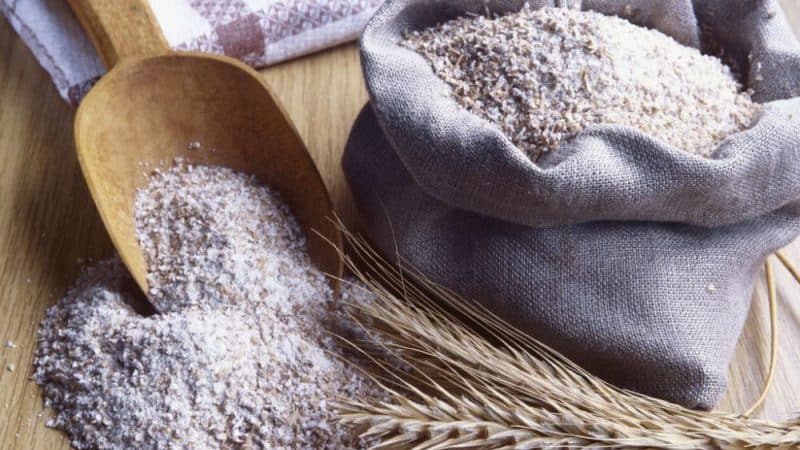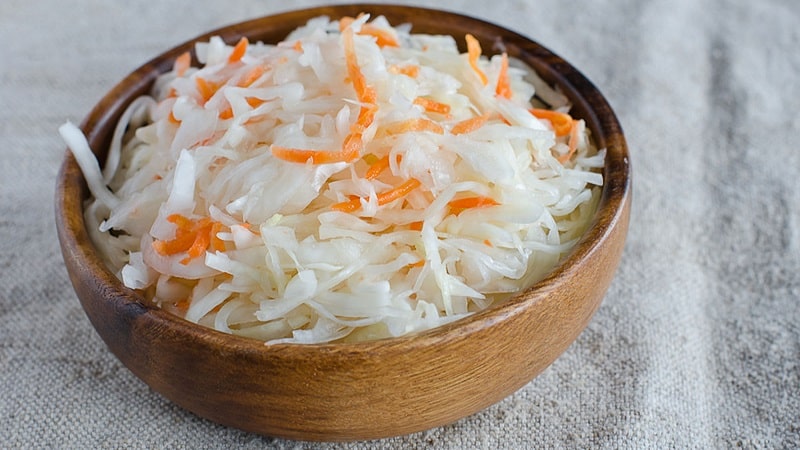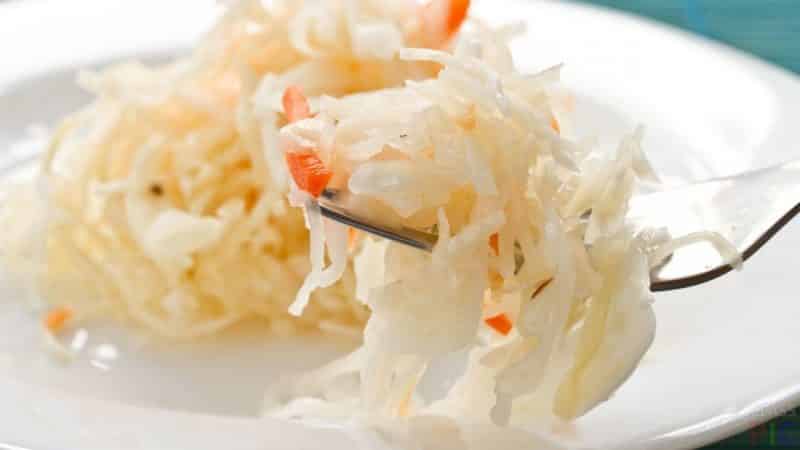How to properly prepare sauerkraut with rye flour
It would seem that it could be simpler to prepare sauerkraut: chop the vegetables, put them in a jar and after a while enjoy the delicious snack. But to make the product really crispy and sharp, the cabbage is fermented in a special way. recipe, adding a secret ingredient - rye flour.
Selection and preparation of main ingredients
To get a tasty and healthy fermented snack, you should take a responsible approach to the selection and preparation of the main ingredients. Many housewives advise choosing mid-season cabbage varieties, with white leaves and a high content of juice, as well as sucrose, fructose, and glucose. It is the presence of a sufficient amount of sugars that starts the fermentation process and has a positive effect on the taste of the product.

Attention! Not suitable for classic recipes early varieties with green upper leaves, as well as later ones, characterized by the presence of characteristic bitterness and the hardness of the leaf blades.
Heads of cabbage of high quality are selected, without traces of rot, darkening of leaves, visible damage and unpleasant odor. Before slicing, wash under running water, leave on the table for a while to drain the liquid, then chop. Peeled and washed carrots are grated on a coarse grater.
The containers for fermentation are glass, enamel, or wood. Any volume is suitable - the main thing is to observe the proportions of the products and follow the cooking recommendations.
Why is rye flour in the recipe, what does it do?
In the old days, to speed up the fermentation process, pieces of rye bread were placed in tubs with shredded cabbage. Currently, housewives add rye flour, and after 6-7 days they receive the finished product. This additive makes the cabbage spicy, sharp in taste with unobtrusive sour notes.

How to cook sauerkraut with rye flour - a classic recipe
For pickling, use pre-prepared cabbage from your own harvest or store-bought (market) forks of mid- and late-ripening varieties.
The amount of the main ingredient in the recipe is changed at your discretion, maintaining the ratio with other products so as not to disturb the balanced taste.
For the preparation you will need:
- cabbage - 5 kg;
- carrots - 280-300 g;
- salt - 100-120 g;
- rye flour - 4-5 tbsp. l.
Many housewives share recipes for sauerkraut, where the exact amount of salt is not indicated and they recommend salting “by eye.” So as not to spoil the taste of pickled vegetables.
Attention! It is generally accepted that the optimal amount of salt is the ratio of 20 g per 1 kg of shredded cabbage.
Step-by-step instruction:
- The top green leaves are removed from the cabbage, the head is washed, chopped and placed in a deep, wide bowl.
- Sprinkle with salt and rub with your hands until the juice comes out.
- The carrots are peeled, washed, chopped on a coarse grater, placed in a bowl and mixed with cabbage.
- The bottom of the container is sprinkled with 2 tbsp. l. rye flour.
- Place several whole cabbage leaves on top, which will protect the cabbage mass from peroxidation and the formation of mucus and other unpleasant surprises.
- Fill the container with shredded cabbage, compacting tightly. Having reached the middle, scatter another 1-2 tbsp over the surface of the chopped vegetables. l. flour.
- Place the remaining vegetables in the container, leaving it a few centimeters short of filling to the top. Space is left for the juice that is released during fermentation.
- Sprinkle rye flour on top and cover with several whole cabbage leaves.
- Cover the cabbage with gauze, set pressure, and leave at room temperature to ferment.
- Place a container under the dish so that the resulting juice does not spread.
- After about a day, foam appears on the surface - this indicates the beginning of the fermentation process. From this moment until the foam settles, the cabbage is pierced with a wooden stick in several places twice a day to release the formed gas. This way, the released juice will be evenly distributed throughout the container and will salt the vegetables.
- Three days after the start of fermentation, the juice that leaked out during the fermentation process is poured into the cabbage, and the appetizer is put in a cold place.
- After 2-3 days, the crispy, “sharp” cabbage is ready to eat.

Recipe Variations
There are many variations of recipes that provide an excellent appetizer with a savory taste, which is suitable both as an independent dish and as an ingredient for salads, first and second courses.
Crispy cabbage with flour
To make cabbage truly crispy, there is one proven method - adding mustard to the appetizer.
To prepare you will need:
- cabbage - 2.5 kg;
- carrots - 120-140 g;
- salt - 50 g;
- mustard powder - 50 g;
- rye flour - 2-3 tbsp. l.
Harvesting method:
- Place the shredded cabbage in a large deep bowl, mix with salt, and knead with your hands.
- While the cabbage mixture releases its juice, grate the carrots on a coarse grater and add them to the cabbage in a bowl.
- Sprinkle the bottom of the dish with a thin layer of mustard powder, then fill the container with cabbage, compacting it well.
- Having reached the middle, sprinkle the cabbage with a layer of flour, then cover the container to the top.
- Rye flour is also sprinkled on top, covered with a cloth dipped in water with mustard, and pressure is applied.
- Leave the container with vegetables at room temperature for 2-3 days, during which time the cabbage mass is pierced with a wooden stick.
- When foaming decreases, the snack is put into a cold place for storage.
Mustard will prevent the formation of putrefactive bacteria and make the snack tasty and crunchy.
With cumin and carrots
Carrots make the appetizer beautiful and bright, and caraway seeds add a special aroma.
- white cabbage - 3-4 kg;
- cumin - 5-10 g;
- carrots - 2-3 pcs.;
- salt - 2.5-3 tbsp. l.;
- sugar - 50-60 g;
- rye flour - 2-3 tbsp. l.
Preparation:
- The washed, peeled head of cabbage is cut and placed in a bowl.
- The carrots are grated on a coarse grater and placed in a bowl with the cabbage mixture.
- Sprinkle the mixture with sugar and salt, knead with your hands until the cabbage becomes softer and the juice releases.
- Sprinkle the vegetables with cumin and stir well.
- Place several whole cabbage leaves on the bottom of the dish, compact the cabbage mass, sprinkle it with flour in the middle.
- A pressure is placed on top, the container is covered with gauze, placed in a bowl in case excess juice is formed, and left to ferment at room temperature.
- A day after fermentation begins, pierce the workpiece with a stick to release the gas. Repeat the procedure for 3-4 days until fermentation slows down.
- When the fermentation process stops, add the released juice to the container and store it in a cold place.

Terms and conditions of storage
Cabbage is considered ready to eat after an average of six days, depending on the temperature at which it is fermented. Store the snack at a temperature no higher than 5°C in a dark place.
Term storage is up to eight months. It is convenient for residents of city apartments to store snacks on the balcony from autumn until the onset of severe frosts. Even if the cabbage freezes, this does not impair its taste or reduce its beneficial properties.
For ease of storage, the workpiece is packaged in bags and stored in a bucket or saucepan.
Advice from experienced housewives
Use the advice of experienced housewives so as not to spoil the taste of sauerkraut:
- Do not fill the container to the very top - leave 5-10 cm for the released juice. If the cabbage turns out to be too juicy for the container, place a tray. The juice that leaked out during fermentation is added to the jar with the snack before putting it in a cold place.
- To compact the cabbage mass well, use a potato masher or a small bottle of water. Place the cabbage as tightly as possible, since the air in the workpiece will reduce the quality of fermentation and make the product soft.
- During fermentation foam forms - this is a normal process. The foam is removed with a clean spoon throughout the fermentation period, otherwise the product will become bitter.
- The mold formed on the surface of the brine is removed, and the oppression, fabric and lid are washed with boiling water.
- For cooking, choose flattened heads of cabbage; these leaves are thin, juicy and most suitable for harvesting for future use.
- Whole cabbage leaves placed on top of shredded cabbage leaves help determine how correctly the fermentation process is proceeding and save the entire appetizer in case of darkening.

Reviews
Experienced housewives and hosts share their impressions of preparing sauerkraut with rye flour.
Svetlana, Perm: «My grandmother taught me to add rye flour when fermenting cabbage; I’ve been cooking this way for many years and recommend it to everyone. The cabbage turns out to be truly crispy, sweet and sour, and aromatic. It’s eaten quickly, I add it to vinaigrettes, salads, cabbage soup, and I just serve it with potatoes and mushrooms.”
Nikolay, Sergiev Posad: “We ferment cabbage, adding rye flour and caraway seeds. This snack has never left anyone indifferent. It takes a little time to prepare, but there is always tasty, spicy, aromatic cabbage in the refrigerator.”
Angelina, Crimea: “At first I didn’t believe that flour could give cabbage crispy properties until I tried it. Now I ferment only according to this recipe.”
Conclusion
Cabbage is fermented both in glass jars and in wooden tubs. The main thing is to choose quality products and the right variety. If fermentation was carried out in compliance with all the rules, after just a week tasty, sharp and crispy cabbage appears on the table.